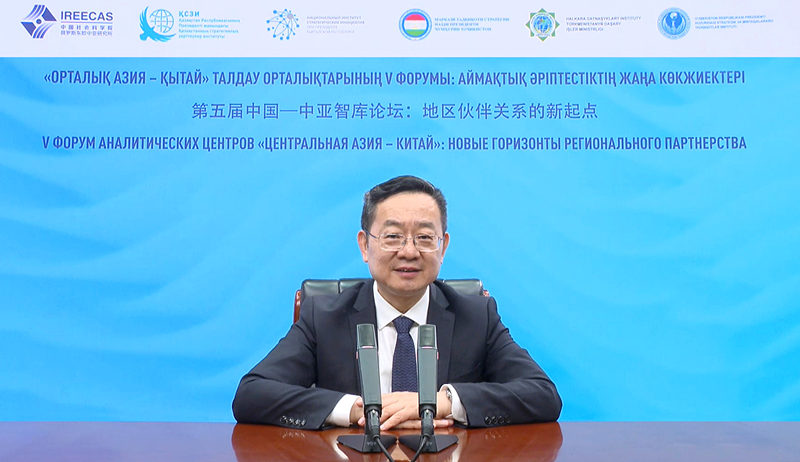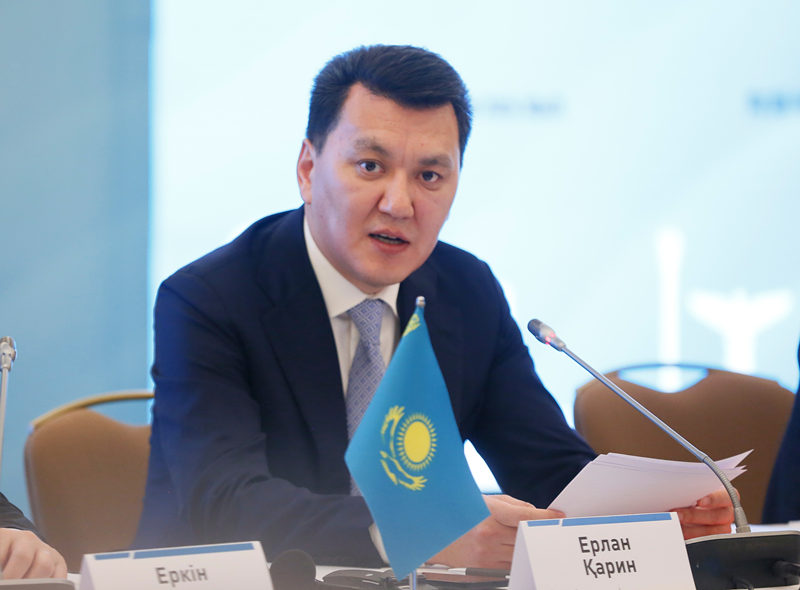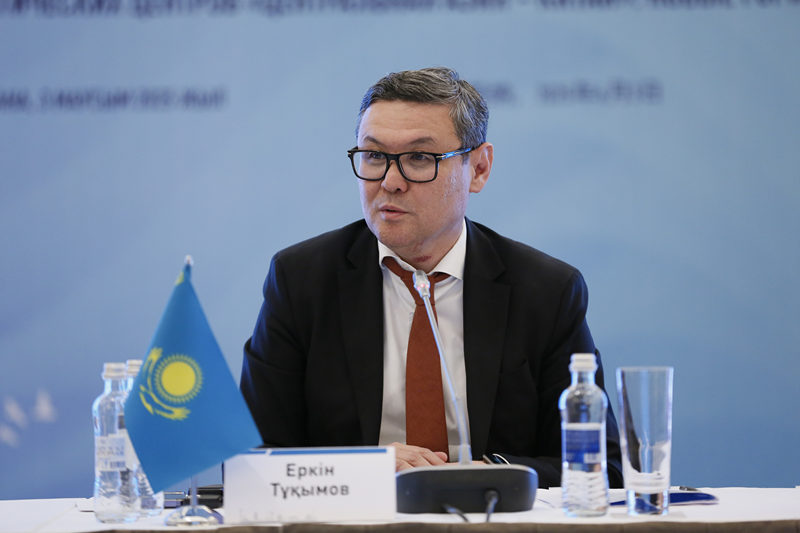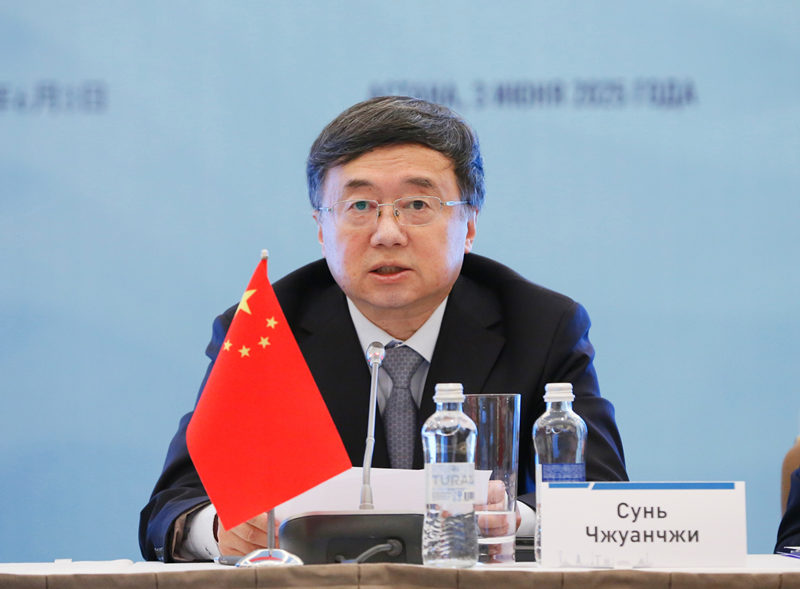

On June 3, the Fifth Think Tank Forum of “China+Central Asia” convened in Astana, Kazakhstan, under the theme “China and Central Asia: A New Starting Point for Regional Partnership.” Gao Xiang, president of the Chinese Academy of Social Sciences (CASS), delivered a video address. The opening ceremony was attended by Erlan Karin, state counsellor of the Republic of Kazakhstan; Yerkin Tukumov, director of the Kazakhstan Institute for Strategic Studies under the President of the Republic of Kazakhstan; and Sun Zhuangzhi, director of the Institute of Russian, East European and Central Asian Studies at CASS. All three delivered remarks at the ceremony.

Gao Xiang, president of CASS, delivering a video address Photo: COURTESY OF THE ORGANIZERS
Gao Xiang noted that China and the Central Asian countries are neighbors linked by shared mountains and rivers. The two sides have consistently treated each other with sincerity and mutual trust, standing as reliable neighbors, trusted friends, and true partners. Under the strategic guidance of President Xi Jinping and the leaders of the five Central Asian states, China–Central Asia relations have achieved “three-full coverage”: comprehensive strategic partnerships across the board; full bilateral implementation of the vision of a community with a shared future for mankind; and the signing of cooperation documents on jointly advancing the Belt and Road Initiative. The continued friendship and cooperation between China and Central Asia have brought a note of optimism to an otherwise unsettled world, fostering a favorable external environment for national development and contributing valuable stability to the broader global landscape.
This year marks the 80th anniversary of the victory of the Chinese People’s War of Resistance against Japanese Aggression, the Great Patriotic War of the Soviet Union, and the World Anti-Fascist War, as well as the founding of the United Nations. At this historic juncture, holding this forum provides an important opportunity to reflect on history, assess the present, and look to the future.
Looking ahead, Gao stated that China and Central Asian countries can achieve shared prosperity by further strengthening mutually beneficial cooperation in areas such as mitigating risks to safeguard regional security, pursuing integrated development for mutual benefit, and facilitating people-to-people exchanges to consolidate the foundation of public support. He emphasized that CASS has long valued its exchanges and cooperation with the Central Asian region and stands ready to further enhance collaboration with major academic institutions and think tanks in the region. CASS will continue to contribute to building a closer China–Central Asia community with a shared future and to opening a new chapter of good-neighborliness, friendship, and mutually beneficial cooperation.

Erlan Karin, state counsellor of the Republic of Kazakhstan, delivering remarks at the opening ceremony Photo: COURTESY OF THE ORGANIZERS
Karin emphasized that China is not only an important neighbor to Central Asian countries but also a trustworthy partner. In recent years, multilateral ties have flourished, with the China–Central Asia mechanism playing a pivotal role. The second China–Central Asia Summit in Astana will see the region’s heads of state lay out new strategic plans for deepening cooperation. Kazakhstan is currently advancing major reforms in social, cultural, educational, and healthcare sectors as part of its efforts to build a more just and open society. These reforms have been widely recognized and supported by China and other Central Asian countries, laying a solid foundation for further strengthening Kazakhstan’s relations with its neighbors. Karin expressed confidence in the bright prospects for China–Central Asia cooperation, noting that this forum would help deepen mutual understanding, build consensus, and facilitate broader, mutually beneficial cooperation.

Yerkin Tukumov, director of the Kazakhstan Institute for Strategic Studies under the President of the Republic of Kazakhstan, delivering remarks at the opening ceremony Photo: COURTESY OF THE ORGANIZERS
Tukumov stated that a new global order is emerging at an accelerating pace, marked by rising uncertainty and instability. In response, Kazakhstan pursues a multi-vector and balanced foreign policy aimed at fostering unity among nations and contributing to the construction of a fair and sustainable international order. A central theme of today’s global politics is the economic and civilizational rise of Asia, a process in which Central Asian countries are playing an active role. Against this backdrop, China–Central Asia cooperation offers a robust foundation for inclusive development across Eurasia. Since the inaugural China–Central Asia Summit in 2023, the two sides have achieved substantial progress. Kazakhstan is eager to deepen its friendly cooperation with China and its regional neighbors in areas such as the development of transportation corridors, high-tech talent training, water resource management, and agricultural modernization.

Sun Zhuangzhi, director of the Institute of Russian, East European & Central Asian Studies at CASS, delivering remarks at the opening ceremony Photo: COURTESY OF THE ORGANIZERS
Sun Zhuangzhi remarked that the China–Central Asia Summit represents a milestone in the history of bilateral ties, setting out a long-term vision and promising future for strengthening the comprehensive strategic partnership and jointly building a regional community with a shared future. Despite global turbulence and uncertainty, the good-neighborly and cooperative relationship between China and the Central Asian countries has maintained steady momentum and strong vitality. This fully reflects the high-level, wide-ranging, multidimensional, and enduring nature of the comprehensive strategic partnership, establishing it as a pioneering and exemplary model across various domains. Looking ahead, China and Central Asia can further elevate their relations by jointly contributing to global governance reform, enhancing strategic coordination within the Belt and Road framework, and fostering a more equitable and cooperative international order.
The forum brought together experts and scholars from numerous think tanks and academic institutions across China and Central Asia. Discussions centered on three main themes: “Strategic Framework of China–Central Asia Cooperation: Systematic, Open, and Mutually Beneficial,” “From Transit Corridors to Economic Hubs: Promising Industries and Priority Projects,” and “Technological Cooperation: Digitalization, Artificial Intelligence, and the Innovation Ecosystem.”
Participants agreed that the China–Central Asia Summit has ushered in a new era of bilateral relations, effectively facilitating ongoing, in-depth, and practical cooperation across multiple sectors. Amid complex regional and global challenges, Central Asian countries are accelerating both domestic and international development efforts, advancing economic restructuring and promoting green and digital transformation at home to continuously improve public well-being. Externally, they continue to uphold a multi-vector and balanced foreign policy aimed at strengthening regional cooperation and sustaining momentum for peace and development. Opportunities in China–Central Asia cooperation continue to outweigh the challenges. The second China–Central Asia Summit will mark a further step toward institutionalizing bilateral cooperation and injecting renewed energy into the relationship. In the years ahead, the two sides are expected to build an even closer China–Central Asia community through joint efforts in connectivity, industrialization, digitalization, and green development.
The forum was co-hosted by the Institute of Russian, Eastern European and Central Asian Studies at the Chinese Academy of Social Sciences; the Kazakhstan Institute for Strategic Studies under the President of the Republic of Kazakhstan; the Institute for Strategic and Regional Studies under the President of the Republic of Uzbekistan; the National Institute for Strategic Initiatives under the President of the Kyrgyz Republic; the Center for Strategic Research under the President of the Republic of Tajikistan; and the Institute of International Relations of the Ministry of Foreign Affairs of Turkmenistan.